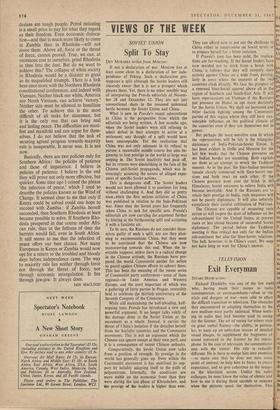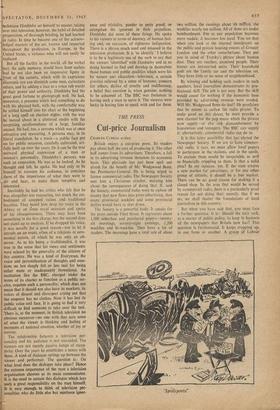TELEVISION
Exit Everyman
STUART HOOD writes: Richard Dimbleby was one of the few men who, having made their names as radio commentators or correspondents—often in the trials and dangers of war—were able to effect the difficult transition to television. The obstacles they encountered in adapting themselves to the new medium were partly technical. When work- ing in radio they had become used to seeing for the listener. The art of seeing for others rests on great verbal fluency—the ability, in particu- lar, to keep up an unbroken stream of detailed visual images, to supplement the fragments of sound conveyed to the listener by the micro- phone. In the case of television, the commentator sees with the viewer. His role is radically different. He is there to nudge him into attention —to make sure that he does not miss sonic point of interest, to help him to focus, to create expectancy, and to give coherence to the images on the television screen. Unlike his radio colleague, he must know the value of silence and how to use it during those seconds or minutes when the pictures speak for themselves. This
technique Dimbleby set himself to master, taking over into television, however, the habit of detailed preparation, of thorough briefing, he had learned in radio. In time he became one of the acknow- ledged masters of the art, known and respected throughout the profession, in Europe, in the United States, a virtuoso who will not easily be replaced.
But all the facility in the world, all the verbal tact, the agile memory, would have been useless had he not also been an impressive figure in .front of the camera, which with its capricious electronic eye can diminish some men, caricature others, and by adding a face to a voice rob words of their power and authority. Dimbleby had the great good fortune to photograph well. He had, moreover, a presence which had something to do with his physical bulk, with the comfortable way he settled himself into his chair at the beginning of a long spell on election nights, with the way he moved about in a cluttered studio with the surprising surefootedness of a large, familiar animal. He had, too, a persona which was at once attractive and reassuring. A persona may, in its literal translation, be a mask—a public face put on for public occasion, carefully cultivated, art- fully built up over the years. Or it can be the true outward physical expression of a man or woman's personality. Dirnbleby's persona was such an emanation. He was as he looked. As he thought and felt, he spoke. He had only to be himself to reassure his audience, to convince them of the importance of what they were to iee and hear, to make them receptive and interested.
Inevitably he had his critics who felt that he was altogether too reassuring, too much the em- bodiment of accepted values and traditional loyalties. They heard him drop his voice in the Abbey or on some royal occasion and spoke of his obsequiousness. There may have been something in the first charge, but the second does not stand up to analysis. If he dropped his voice, it was usually for a. good reason—not to let it intrude on an event, often of a religious or cere- monial nature, of which he was only an ob- server. As to his being ,a traditionalist, it was true in the sense that his views and sentiments were echoed by the generality of the citizens of this country. He was a kind of Everyman, the voice and personification of thoughts and emo- tions no less deeply felt or less real for being either mute or inadequately formulated. An institution like the BBC, charged under the terms of its charter to function as a public ser- vice, requires such a personality; which does not mean that it should not also have its mockers, its voices of dissent and disrespect crying out that the emperor has no clothes. Now it has lost its public voice and face. It is going to find it very difficult to find someone to take over the task. There is,, at the moment, in British television no obvious successor—no one with that sure sense of what the viewer is thinking and feeling at moments of national emotion, whether of joy or sorrow.
The relationship between a television per- sonality and his audience is not one-sided. The viewers are not merely passive lumps of recep- tivity. Over the years he establishes a nexus with them. A kind of dialogue springs up between the viewer and performer. The question is: On what level does the dialogue take place? Hence the extreme importance of the man a television organisation chooses as its main commentator. It is the,need to sustain this dialogue which lays such a great responsibility on the man himself. It is easy enough to think of television per- sonalities who do little else but reinforce ignor- ance and triviality, pander to petty greed, or strengthen the ignorant in their prejudices. Dimbleby did none of these things. He spoke to his viewers in terms of decency, of human feel- ing and, on occasion, of righteous indignation. There is a phrase much used and misused in the television profession. It is 'to identify.' I believe it to be a legitimate use of the verb to say that the viewers 'identified' with Dimbleby and in so doing learned to find and develop in themselves those human and public qualities which were his by nature and education—tolerance, a certain gravitas relieved by a sense of humour, concern for others, dislike of cruelty and indifference, a belief that emotion is, when genuine, nothing to be ashamed of. The BBC was fortunate in having such a man to serve it. The viewers were lucky in having him to speak with and for them.

















 Previous page
Previous page